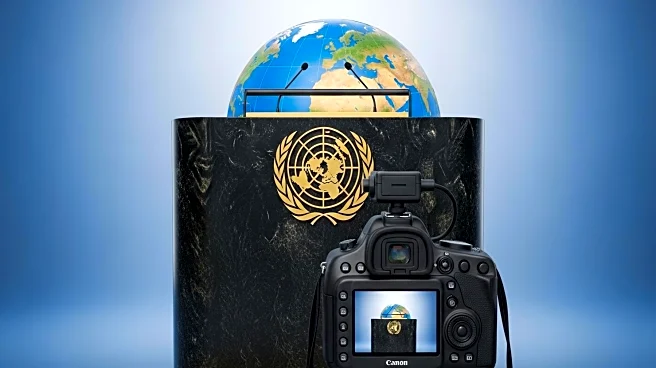What is the story about?
What's Happening?
The United Nations General Assembly has voted to allow Palestinian President Mahmoud Abbas to address its annual meeting via video after the United States revoked his visa. The decision was made with a vote of 145 to 5, with six abstentions. Abbas had intended to attend a meeting organized by France and Saudi Arabia to advance a two-state solution to the Israeli-Palestinian conflict. The U.S. opposed these efforts, arguing that the promise of statehood has emboldened Hamas, complicating ceasefire and hostage release negotiations in Gaza. The U.S. State Department revoked visas for approximately 80 Palestinian officials, including Abbas, citing undermining peace efforts. The UN's decision to allow Abbas to speak remotely is seen as a response to the U.S. visa revocation, which has been criticized as a violation of the Host Country agreement.
Why It's Important?
This development highlights ongoing tensions between the U.S. and Palestinian leadership, impacting international diplomatic efforts regarding the Israeli-Palestinian conflict. The U.S. visa revocation has drawn criticism from allies such as France and the U.K., who urged reconsideration. The UN's decision to allow Abbas to speak remotely underscores the international community's commitment to facilitating dialogue despite political obstacles. The situation affects peace negotiations and the broader geopolitical landscape, with potential implications for U.S. relations with other countries advocating for Palestinian statehood.
What's Next?
The UN's decision may lead to increased diplomatic efforts to address the Israeli-Palestinian conflict, with France and Saudi Arabia advancing a phased plan for Palestinian statehood. The plan involves governance by Abbas' Palestinian Authority with international assistance. The U.S. may face pressure to reconsider its stance on Palestinian statehood and visa policies. The situation could influence future peace negotiations and international relations, particularly with countries supporting Palestinian statehood.
Beyond the Headlines
The visa revocation and subsequent UN decision reflect deeper issues in U.S.-Palestinian relations, including accusations of corruption and autocracy within the Palestinian Authority. The situation raises questions about the effectiveness of current peace efforts and the role of international organizations in mediating conflicts. Long-term implications may include shifts in diplomatic strategies and alliances, as well as changes in public perception of the Palestinian leadership.















